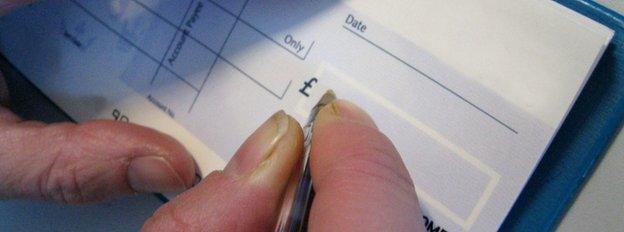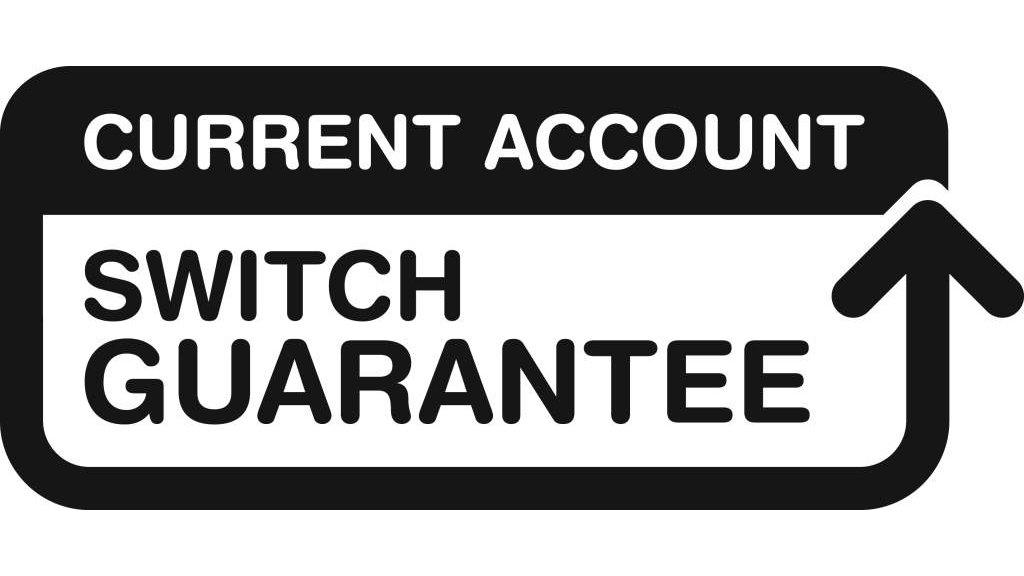Bank customers 'could save £70 a year', CMA concludes
- Published
How to leave your bank... in 60 secs
Bank customers could save an average of £70 a year by switching their current accounts to another provider, the regulator has found.
After an 18 month inquiry, the Competition and Markets Authority (CMA) has stopped short of recommending a break up of the banks.
But it said, external customers should be prompted to change providers if their branch closes or they are overcharged.
Banks have welcomed the report, saying the industry is pro-competition.
However the CMA concluded that competition in the market is not working properly.
It said that the majority of consumers - 57% - have stayed with their provider for more than 10 years.
And 37% have had their accounts for more than 20 years.
Only 3% of customers switched in 2014, the CMA said.
Separate figures from the Current Account Switching Service show that the number of people transferring their current account has fallen by 14% in the last year.
'Complex charges'
Among its provisional recommendations, the CMA suggests High Street banks should:
Prompt customers to switch at certain trigger points, for example if their branch closes or overdraft charges change
Make it easier for customers to switch by up-grading Midata, a service which allows customers to see their transaction history
Set up a new price comparison website for small businesses
Fund a "sustained" advertising campaign for the Current Account Switching Service (CASS)
In addition it said that customers faced "complex overdraft charges and limited information".
It said that those who go into the red on a regular basis could save as much as £260 a year by switching accounts.
However there was no reason to end the UK's model of free banking, if a customer is in credit, the CMA said.
It found no evidence that the free-if-in-credit system distorted competition.

"Despite some encouraging developments, particularly in the shape of challengers that have entered the market in recent years, for too long banks have been able to sit back and take their existing customers for granted," said Alasdair Smith, head of the retail banking investigation for the CMA.

Analysis: Kamal Ahmed, BBC business editor
The Competition and Markets Authority investigation into banking is more significant for what it didn't say than for what it did.
Britain's major High Street banks - which provide 85% of current accounts in the UK - will not face being split up.
And "free" current accounts, as long as they are in credit, are here to stay.
That is despite the fact, of course, that they are not really free at all but are paid for by account fees, overdraft charges and forgone interest (that's the money customers would receive if banks offered higher levels of interest on current account deposits).
Switching levels are low among current account holders and businesses because comparing "prices" in banking is just about impossible.
Following the CMA report, that is not likely to change very rapidly. The major banks will be heaving a sigh of relief this morning.


'Disengaged'
The CMA said customers still feared that switching their current account would be "complicated, time-consuming, and risky".
It said that the Current Account Switching Service - set up two years ago - was working reasonably well, but awareness and confidence in the service were low.
The Banking industry welcomed the report, saying that the empowerment of customers was crucial.
"The report has a number of pragmatic suggestions to increase awareness of switching, which will further put customers in control of their banking choices," said Anthony Browne, the chief executive of the British Bankers Association (BBA).
But the consumer organisation Which? was more sceptical.
"The CMA inquiry has to bring about better banking, but these proposals don't go far enough," said Richard Lloyd, the executive director of Which?
"The CMA's own evidence is that consumers are disengaged from the banking market, so better information and nudges to switch will not be enough."
The regulator's final report will be published in May 2016.
- Published22 October 2015

- Published22 October 2015

- Published11 September 2014
